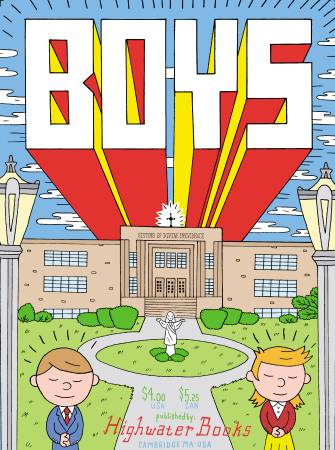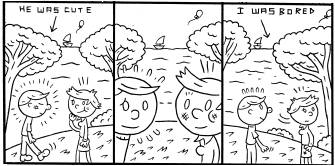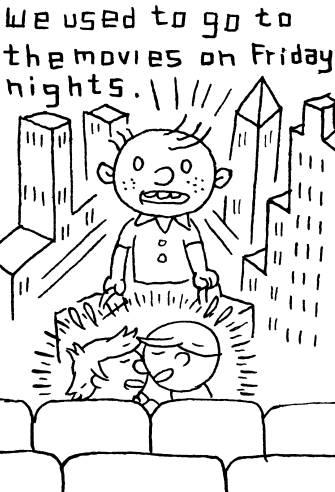 Home > CR Interviews
Home > CR Interviews CR Holiday Interview #18—Dan Nadel On Boys
posted June 19, 2010
CR Holiday Interview #18—Dan Nadel On Boys
posted June 19, 2010

 Dan Nadel
Dan Nadel is the driving force behind
Picturebox, Inc. and the author of several significant pieces of writing about comics including but not limited to
Art Out of Time: Unknown Comics Visionaries 1900-1969, whose
sequel is set to appear this year. He agreed to discuss a comics work in this series after I did a lot of begging. One of his choices was the
Ron Regé Jr/Joan Reidy effort
Boys, a straight-up single-issue comic book that came out from the now-defunct and much-missed
Highwater Books at the beginning of the most recent ten-year period.
Boys featured a series of single-page stories about Reidy's teenage encounters with sex and lust, as told in straightforward fashion by Regé. It's a great comic book, one burned into my memory, and I couldn't resist making that one the choice for our discussion. -- Tom Spurgeon
*****
TOM SPURGEON: Boys
came out in 2000. How did you encounter the comic? Were you aware of Ron Regé before that book came out, had you picked up Dum Dum Posse Reader
or any of the minis?
DAN NADEL: I think I first saw
Boys at
Jim Hanley's Universe in New York. I remembered Ron's work from a mini comic I'd ordered from
Spit and a Half -- I think -- called
Andy Remembers. But
Boys was something else entirely. You couldn't really miss it when browsing the racks.
 SPURGEON: For that matter, I guess we should talk about why you chose
SPURGEON: For that matter, I guess we should talk about why you chose Boys
rather than Against Pain
, where -- I believe -- the former work was later collected, along with a lot of other very good comics. Is there something about how Boys
functioned as a comic book that's specifically appealing to you?
NADEL: To my mind,
Boys remains one of the most perfect comic books ever published. It is a single object that encapsulates an entire sensibility in 24 pages. The front cover -- hand drawn but consciously designed; looking less like a comic and more like a zine of my dreams -- opens to a scrappy title page and Regé and Reidy's yearbook photos are printed on the inside covers. Twenty comic strips later and we're done. And then there is the advertisement in the back for other Highwater projects and a slew of Providence-based minis that people are only just catching up to. Circa 2000 was a good time for good times. It functions as a comic book should: an intimate shapshot of a time, place and sensibility.
 SPURGEON: Building on that a bit, I can't imagine a comic book like this coming out now, at least not as a comic book.
SPURGEON: Building on that a bit, I can't imagine a comic book like this coming out now, at least not as a comic book.
NADEL: Me neither. It's impossible to imagine, actually.
SPURGEON: That's one of the great trends of comics over the last ten years, really, this snuffing out one by one of the traditional comic book as a place to find this kind of work. Beyond the nostalgia involved, do you have regrets that this has happened? Do you think that's a format with inherent appeal, or a specific way of functioning in a market, or is it more of an accident we shouldn't worry after?
NADEL: Comic books force brevity. 100 of these strips would have killed it. 50 of these strips would have killed it. Twenty was the perfect amount -- each is potent, each builds on the other. And the singularity of it -- the fact that this was all there was to read of this body of work -- all contained in this object gave it an incredible power. Every last bit of the comic works towards the reader focusing on these few comic pages. It doesn't work as well in
Against Pain simply because it becomes one body of work among many. As a comic book it is all you can focus on, and lends it an intimacy that no other format is capable of.
 SPURGEON: Regé's art in
SPURGEON: Regé's art in Boys
is crisp to the point of giving the reader paper cuts. How do you feel about this work in the context of his entire career? My flash reaction is that the art was more appealing than it was wholly satisfying in terms of the skill displayed, and that he's done better work before and since even if I can understand why some people might prefer the work here. But that's memory, and not exactly well-informed memory, either. What's your sense of the art in Boys
? Is Regé generally under=appreciated?
NADEL: I'll just go in for hyperbole here: Ron's work was a revelation for me. His web of lines, his flatness, his use of the comics page as a place for raw emotion without "realist" hysteria remains important. It seemed to me very skillful cartooning and while, yes, not as polished as his later work, it was very immediate. There's a kind of vibration in those lines -- an artist finding his distinct voice for the first time. Ron might be a bit under-appreciated, but, then, it can be difficult work, and while you and I might align it with "classic" cartooning, most people can't see the through-line to
Schulz. So... yes, in the sense that I think Ron is one of our real contemporary greats, yes, I suppose he is under-appreciated.
 SPURGEON: There's something very satisfying about
SPURGEON: There's something very satisfying about Boys
for the fact that it's multiple, interconnected pieces. All of the beginning and ends seem to give it a heft that I'm not sure would exist in a 20-page narrative. Do you feel the work comes together, coheres? How do you think it works as a single work as opposed to a series of works?
NADEL: I think it works best as compilation of one-page comics, yes. The individual pages work on their own in anthologies, but really it's the feeling of reading a series of discreet moments in time that really gives it its power. After each page you understand a bit more about Joan's life and a bit more about Ron's visual language, so by the end these insights have accumulated into a complete worldview.
SPURGEON: Frank Santoro wrote a blog post in 2008 about the comic. He notes an underlying darkness, and I wondered if that was your impression as well. Are there other tensions you see in the comic?
NADEL: The tension between the "cuteness" of Ron's drawing and the melancholy of Reidy's prose is the primary tension for me. I don't know if I'd call it dark, but it's certainly not "happy." But here's the thing about
Boys: It's sexy. Here were these explicit stories being told by a woman in the way that you imagine -- or fear -- a woman recounting your sexual experience, and drawn in this counter-intuitive way.
 SPURGEON: Whatever happened to Joan Reidy? What did you think of her contribution?
SPURGEON: Whatever happened to Joan Reidy? What did you think of her contribution?
NADEL: I don't know what happened to her. I assume she's out there somewhere. Her contribution and Ron's are kind of seamless. I can't imagine one working without the other, really. Her frank prose gives the comics a hard edge, anchoring an abstract cartoon style to fleshy physicality.
SPURGEON: Boys
was a Highwater comic. I think one of the noteworthy trends of the 2000s is this interesting work coming from tiny, tiny publishers and the occasional cold splash of reality that comes as they're forced to close down. Luckily for us as comics readers, Tom Devlin found like the greatest lifeboat ever with D&Q. Working on your PictureBox line, were you inspired at all by what companies like Highwater did? Do you draw additional inspiration or encouragement from contemporary companies like Bodega or Secret Acres or Blank Slate?
NADEL: Highwater was certainly an inspiration on a few fronts: For one thing, my first exposure to
Leif Goldberg,
Mat Brinkman and
Brian Chippendale was via Tom's table at
SPX 2000. That was where I met Ben Jones for the first time. Anyhow, just that Tom was distributing that stuff was/is hugely important. Then there was the aesthetic, which looks so prescient now: handmade-feeling, personal, and not "comics-y". And of course there was Tom's championing of a certain group of cartoonists; projecting the idea of a "gang" (real or imagined) that would/could kill you and take all your comic books. But that was the last time I was excited about a comic book company, to be honest. I respect those other companies, but I don't draw inspiration from them. Small publishing is tough, and I tend to look towards other media for inspiration.
 SPURGEON: What about
SPURGEON: What about Boys
lingers for you? Why that book of all the books you thought of when I asked you to select a work to discuss?
NADEL: Boys has stayed with me because it was the first time in my adult life -- I was 23 when it came out -- that I picked up a comic book and felt like it was speaking directly to me. I had that experience the first time I listened to
Let it Be by The Replacements when I was 16. I felt like I knew these people -- shit, I felt like I knew Ron. The prose, the drawings -- it all seemed as though I'd been waiting for it my whole life, and there it was. It also seems to me like the first published salvo in a generational shift that occurred this decade -- running parallel to the brilliant "literary fiction" successes in graphic novels -- as the rise of the Providence aesthetic became so important for comics and visual culture.
*****
*
Boys, Ron Regé and Joan Reidy, Highwater Books, 24 pages, 2000.
*
Against Pain, Ron Regé, Drawn and Quarterly, hardcover, 128 pages, 9781897299296, July 2008, $24.95
[the first title, a comic book, is out of print; the second title, a hardcover collection that contains the "Boys" effort, is in print]
*****
This year's CR Holiday Interview Series features some of the best writers about comics talking about emblematic -- by which we mean favorite, representative or just plain great -- books from the ten-year period 2000-2009. The writer provides a short list of books, comics or series they believe qualify; I pick one from their list that sounds interesting to me and we talk about it. It's been a long, rough and fascinating decade. Our hope is that this series will entertain from interview to interview but also remind all of us what a remarkable time it has been and continues to be for comics as an art form. We wish you the happiest of holidays no matter how you worship or choose not to. Thank you so much for reading
The Comics Reporter.
*
CR Holiday Interview One: Sean T. Collins On Blankets
*
CR Holiday Interview Two: Frank Santoro On Multiforce
*
CR Holiday Interview Three: Bart Beaty On Persepolis
*
CR Holiday Interview Four: Kristy Valenti On So Many Splendid Sundays
*
CR Holiday Interview Five: Shaenon Garrity On Achewood
*
CR Holiday Interview Six: Christopher Allen On Powers
*
CR Holiday Interview Seven: David P. Welsh On MW
*
CR Holiday Interview Eight: Robert Clough On ACME Novelty Library #19
*
CR Holiday Interview Nine: Jeet Heer On Louis Riel
*
CR Holiday Interview Ten: Chris Mautner On The Scott Pilgrim Series
*
CR Holiday Interview Eleven: Tim Hodler On In The Shadow Of No Towers
*
CR Holiday Interview Twelve: Noah Berlatsky On The Elephant And Piggie Series
*
CR Holiday Interview Thirteen: Tucker Stone On Ganges
*
CR Holiday Interview Fourteen: Douglas Wolk On The Invincible Iron Man: World's Most Wanted
*
CR Holiday Interview Fifteen: Jog On Death Note
*
CR Holiday Interview Sixteen: Ben Schwartz On BPRD
*
CR Holiday Interview Seventeen: Grant Goggans on 2000 AD
*****

*****
*****


